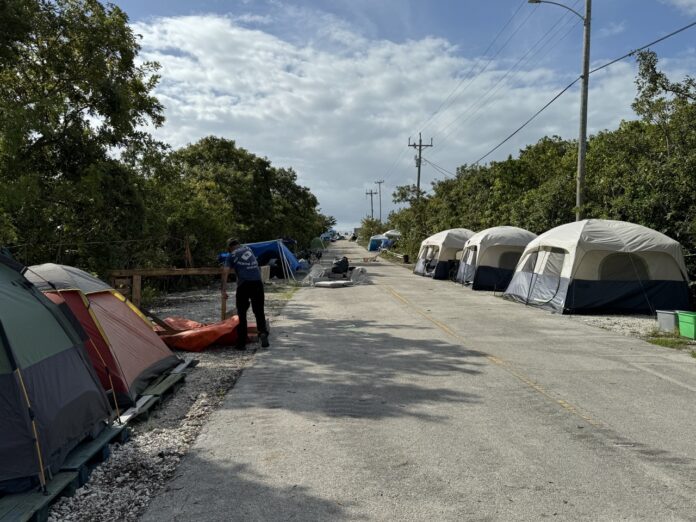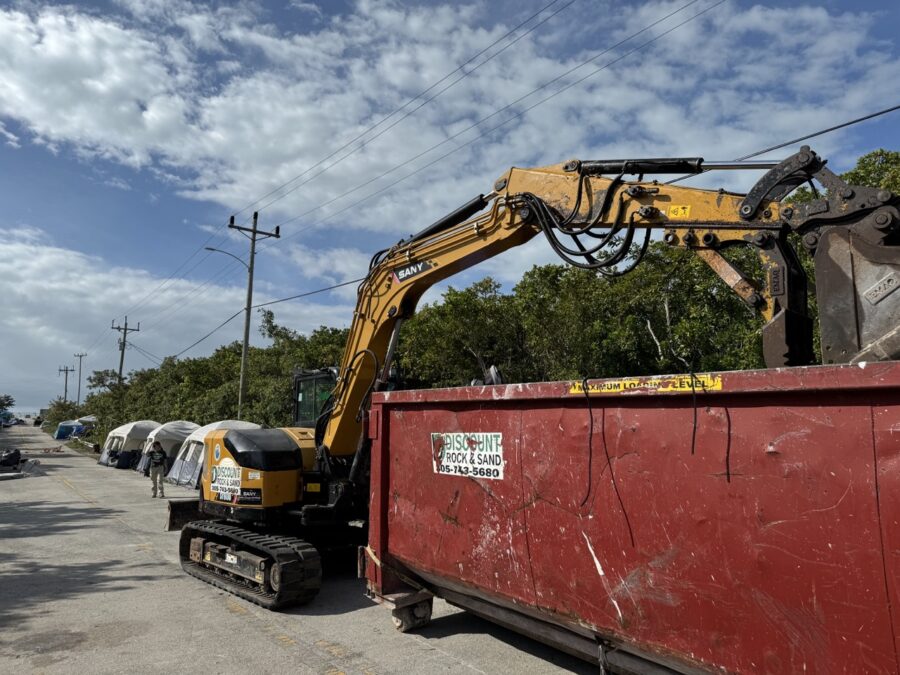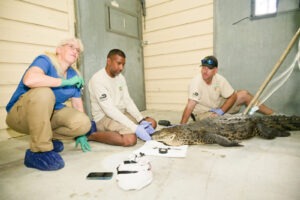
A bill set to reshape the treatment of Florida’s homeless population received its expected signature from Gov. Ron DeSantis on March 20.
House Bill 1365, entitled “Unauthorized Public Camping and Public Sleeping,” made its way to the governor’s desk for final approval following 82-26 and 27-12 votes in the Florida House and Senate, respectively, during the 2024 legislative session. DeSantis heavily endorsed a push to crack down on public camping in early February, delivering a press conference while standing at a podium with a sign reading “Don’t Allow Florida to Become San Francisco.”
At a press conference in Miami Beach on Wednesday morning, DeSantis said the bill, set to take effect on Oct. 1 of this year, will “help maintain and ensure that Florida streets are clean and safe for our residents.”
The governor acknowledged that homeless populations have “needs that need to be met” for treatment of substance abuse and mental health issues, among other services, “But doing the San Francisco and New York model is not a way to get the job done.”
While providing clear direction to the state as a whole on Florida’s treatment of homeless encampments moving forward, numerous clauses within the bill leave plenty of mud in the water as to how exactly it will apply in the Florida Keys.
The new legislation “prohibits counties and municipalities from authorizing or otherwise allowing public camping or sleeping on public property.” However, a county or municipality can choose to designate an area of its own property for this purpose for one year through a majority vote of its governing body – provided it satisfies a litany of conditions to certify the area through the Florida Department of Children and Families.
Permitted only in areas where there are not available beds in homeless shelters, certified areas must provide access to restrooms, running water, consistent safety patrols and behavioral health services including substance abuse and mental health treatment resources. Drug and alcohol abuse is prohibited within the certified area, and it’s currently unclear whether a governing body could vote to renew the same designated camping area in subsequent years.
According to the bill, the certified area may not border property designated for residential use. Language also prohibits use of an area that would “adversely and materially affect the property value or safety and security of other existing residential or commercial property,” and provides a mechanism for affected residents and business owners to file civil suits against a local government.
The bill’s impact may be minimal in areas of the island chain like Key West, which since 2004 has provided shelter and showers for homeless individuals at the Keys Overnight Temporary Shelter (KOTS). But 50 miles away in Marathon, the subject of a growing homeless population is a recurring point of contention at recent city council sessions.
With no homeless shelter to speak of, Marathon is currently legally prohibited from removing homeless individuals from public areas. The result is a growing homeless encampment along the 20th Street right-of-way leading to the decommissioned Boot Key Bridge – an area Marathon officials are careful to say is not actively managed by the city, though it has its own Dumpster, portable restroom and additional lighting installed.

That encampment has been under heavy scrutiny – particularly from nearby residents and businesses – in recent months, and has more recently made its way into the headlines of the Monroe County Sheriff’s Office press releases.
On Jan. 27, a 58-year-old man was arrested after allegedly “hitting another man on the street with the butt of a knife and threatening a woman with the same knife.” A little over a month later, a reported fight inside a tent led to the arrest of a 30-year-old Key West man who had also allegedly hit another man with a metal rake earlier in the night.
“In the last couple of months, we’ve had some pretty violent crimes in the area,” confirmed Lt. Lissette Quintero, who oversees the sheriff’s office’s Marathon substation. “It’s not necessarily the volume of calls that’s increased, but the severity. It may very well be because there are a lot of individuals that are identified as newcomers to the area.”
Marathon has thus far orchestrated two major “cleanups” of the area – one in October 2023, and another on March 1, 2024 – in which accessory structures and other items beyond tents and basic necessities were removed following a notice to area residents. The city plans to continue these cleanups on a monthly basis, City Manager George Garrett told the Weekly.
According to statistics provided to the Weekly by Quintero, in the three months prior to October’s cleanup, the sheriff’s office responded to five physical batteries in the area, 13 verbal disturbances, three thefts and one sex offense. From the beginning of 2024 to the March cleanup, there were nine physical batteries, five verbal disturbances and three thefts.
At first glance, DeSantis’ signature would appear to force a point of reckoning for 20th Street and other similar encampments in the Keys. But provisions tacked on to the end of the bill – and one notable omission – beg a series of questions.
While the 20th Street right-of-way is technically under the purview of the Florida Department of Transportation, the bill makes no mention of camping restrictions on state-owned land. It also contains exceptions for counties under a state of emergency, or any immediately adjacent counties – something that has applied to the Florida Keys at nearly all times since 2017, due to Hurricane Irma, the COVID-19 pandemic and migrant influx crises.
Though both Garrett and City Attorney Steve Williams said they weren’t overly concerned about the results of the bill, Williams told the Weekly that compliance with the new rules would be “an impossibility” on city-owned land. He said the bill, which he called the “biggest unfunded mandate in years,” could also complicate construction of a homeless shelter in the future, should Keys municipalities decide to pursue that route.
As properties with several different zoning classifications can theoretically be used for residential structures, Williams said the bill’s prohibition of using adjacent properties for shelters or certified camping areas “is the part that’s confusing us. We can’t think of any place that that applies in Monroe County.”
Asked directly whether the bill’s passage would be the end of the 20th Street encampment, Williams said, “I don’t know. In the definitions of this bill, 20th Street is not county or municipality property.”




















